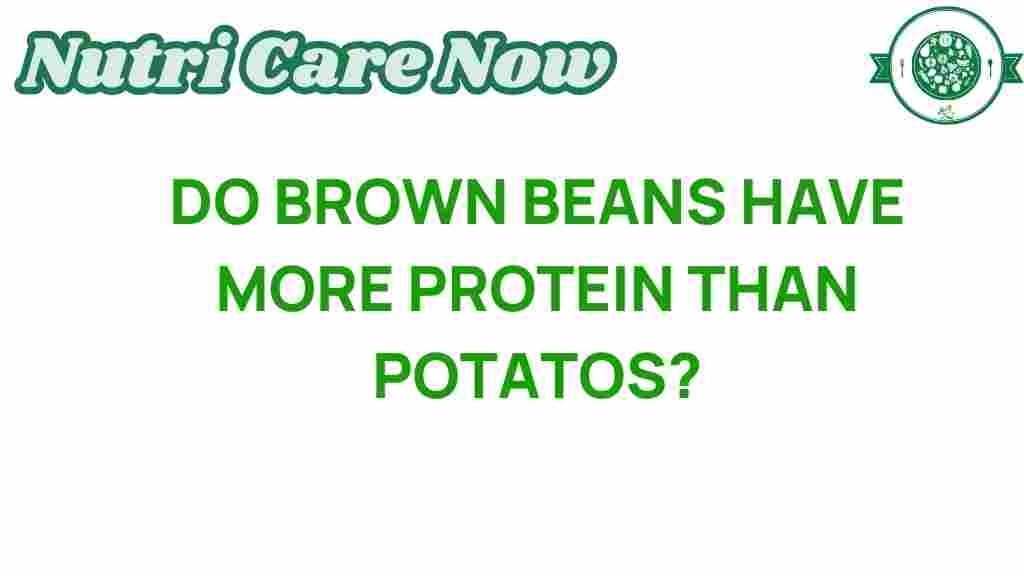Unveiling the Protein Power: Do Brown Beans Outshine Potatoes?
When it comes to making dietary choices, understanding the nutritional value of the foods we consume is crucial. Two popular food items that often appear on our plates are brown beans and potatoes. Both offer unique benefits, but how do they compare, particularly in terms of protein content? This article delves into the nutrition facts of brown beans and potatoes, exploring their protein comparison, and examining their roles in healthy eating and plant-based diets.
Understanding Brown Beans and Their Nutritional Profile
Brown beans, also known as pinto beans, are a type of legume that is rich in essential nutrients. They are celebrated for their high protein content, making them a valuable component of a plant-based diet.
Nutrition Facts of Brown Beans
Here are some key nutrition facts about brown beans:
- Protein: Approximately 15 grams per cooked cup.
- Fiber: About 15 grams per cooked cup, promoting digestive health.
- Vitamins: Rich in folate, iron, and magnesium.
- Calories: Roughly 245 calories per cooked cup.
These beans are not only a great source of protein but also provide numerous health benefits due to their high fiber content and essential vitamins and minerals.
Exploring Potatoes and Their Nutritional Composition
Potatoes, a staple food in many cultures, are often viewed as a comfort food. However, they also offer nutritional benefits that should not be overlooked.
Nutrition Facts of Potatoes
Here are some important nutrition facts about potatoes:
- Protein: Approximately 4 grams per medium-sized potato.
- Fiber: About 2 grams per medium-sized potato, depending on preparation.
- Vitamins: High in vitamin C, B6, and potassium.
- Calories: Roughly 130 calories per medium-sized potato.
While potatoes provide some protein and essential nutrients, their protein content is significantly lower than that of brown beans.
Protein Comparison: Brown Beans vs. Potatoes
When comparing brown beans and potatoes, brown beans clearly outshine potatoes in terms of protein content. Let’s break down the differences:
- Protein Content: Brown beans contain about 15 grams of protein per cooked cup, whereas potatoes only offer about 4 grams of protein per medium-sized potato.
- Protein Quality: The protein in brown beans is considered high quality as it contains essential amino acids that are vital for body functions.
- Dietary Fiber: Brown beans are also superior in fiber content, which aids in digestion and helps maintain a healthy gut.
The Role of Protein in Healthy Eating
Understanding the role of protein in our diets is essential for making informed dietary choices. Protein is a macronutrient that is crucial for:
- Muscle Repair: Essential for repairing tissues and building muscles.
- Immune Function: Plays a vital role in the immune system and overall health.
- Satiety: Helps keep you feeling full longer, which can aid in weight management.
Incorporating brown beans into your meals can significantly boost your protein intake, especially for those following a vegetarian or vegan lifestyle.
Incorporating Brown Beans into Your Diet
Here are some delicious ways to include brown beans in your meals:
- Soups and Stews: Add cooked brown beans to soups and stews for a hearty boost.
- Salads: Toss them into salads for added protein and texture.
- Purees: Blend brown beans into dips or spreads.
- Chili: Use them as a base for vegetarian chili recipes.
These methods not only enhance flavor but also contribute to a balanced diet rich in plant-based protein.
Common Misconceptions About Potatoes
Despite their lower protein content, potatoes are often misunderstood. Here are some common misconceptions:
- “Potatoes Are Unhealthy”: When prepared healthily (baked or boiled, not fried), potatoes can be nutritious.
- “Potatoes Have No Nutritional Value”: Potatoes are a good source of vitamins and minerals, particularly when eaten with the skin.
In moderation and prepared wisely, potatoes can still play a role in a balanced diet.
Troubleshooting Tips for Cooking Brown Beans
Cooking brown beans can sometimes be a challenge. Here are some troubleshooting tips:
- Soaking: Always soak brown beans overnight to reduce cooking time and improve digestibility.
- Cooking Time: Ensure you cook them long enough; undercooked beans can be hard and indigestible.
- Flavoring: Add spices and herbs during cooking for enhanced flavor.
Conclusion: Making Informed Dietary Choices
In the realm of healthy eating, understanding the nutritional profiles of foods is vital. Brown beans offer a significant advantage over potatoes when it comes to protein content and overall nutrition. Their high protein and fiber content make them an excellent choice for anyone looking to enhance their diet with plant-based protein sources.
While potatoes have their own nutritional benefits, they should be consumed as part of a balanced diet that includes a variety of foods. By incorporating brown beans into your meals, you can enjoy a delicious and nutritious way to meet your protein needs.
For more information on healthy eating and dietary choices, check out this comprehensive guide on plant-based proteins. If you’re interested in exploring more about food science and nutrition, visit this external resource.
In conclusion, when it comes to the protein power of brown beans versus potatoes, brown beans indeed outshine potatoes in the protein comparison. Make informed choices and enjoy the benefits of including this powerhouse legume in your diet!
This article is in the category Diet and created by NutriCareNow Team
